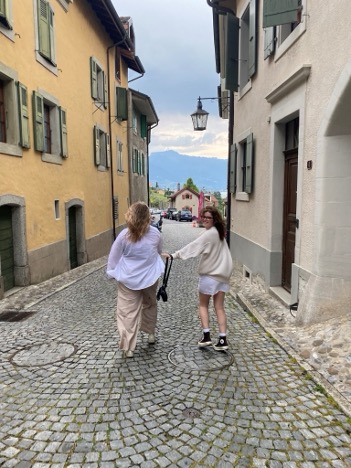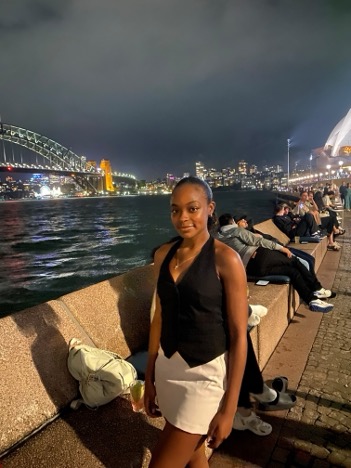3 STEM Students Weigh in on Studying Abroad, Share Highlights
Taking Technical Courses and Developing Problem-Solving Skills Can Take Place in Many Ways and Countries
With many different STEM-related programs, students who are studying the sciences at BU have options when it comes to studying abroad and challenging themselves in unfamiliar environments.
While focusing on the frontiers of science and technology can be challenging in and of itself, many students also seek to take technical courses and develop their problem-solving skills while experiencing life in a new country. This can take place in many different ways and countries, as students study abroad for different reasons and have lots of diverse interests, both in and outside of their major.
For those who want to ensure they are staying on track and taking courses required of their major, you’ll find courses like organic chemistry, cellular biology, physiology, quantum physics, microbiology, differential equations, and more in different STEM or STEM-related study abroad programs.
We asked three students, studying data science, psychology, and biology, about why they studied abroad, what their experiences were like, and what advice they would give to their peers who are in STEM and considering going abroad.
Leonardo Perez Loynd (CDS ’25), a Somerville, MA native who is majoring in data science, did the Madrid Internship Program during summer 2024.
Alicia Dennery (CAS ’25), a Thomas M. Menino Scholar, is from Boston and is majoring in psychology and minoring in biology, with the goal of becoming a physician’s associate. She studied abroad twice, doing the Madrid Science Program and the Sydney STEM Program.
Elizabeth Rosen (CDS ’25), a Marblehead, MA native who is majoring in data science, participated in the Geneva Global Governance and Global Challenges Program in summer 2023. Long term, she wants to go into computational biology research.
Q&A
Global Matters: Why did you decide to study abroad?
Alicia Dennery: I am from Boston and never really left Boston because I came to BU. I had never “spread my wings and left the nest,” so to speak and never got to experience that. So, studying abroad was an amazing opportunity for me to do that. I loved it so much that I studied abroad twice. I felt very fulfilled after my study abroad – like my college experience was top tier because of it.
Leonardo Perez Loynd: My mother is from Spain, and my grandmother lived in Madrid my entire life. I think I speak Spanish fluently now, but it’s hard to stay on top of slang words and stuff like that when you don’t live there. So it was partially for the immersion, because I love Madrid. I was also excited to be able to do an internship abroad because I could see what it’s like to live in Spain, which is something I could do.
Elizabeth Rosen: I wanted the opportunity to travel, and I knew that the best way to do that was through study abroad. Studying abroad was something that I always wanted to do when I got to college. There isn’t a study abroad program specifically for data science, so I did one of the summer programs: Geneva Global Governance because there was a minute where I wanted to do public health policy analysis with data science.

Global Matters: Can you share a little about your experience abroad? What courses did you take? Any highlights you’d like to share about your time studying abroad?
Alicia Dennery: When I did the Madrid Science program, I studied organic chemistry and then cellular biology. I also studied medical ethics within the Spanish context, and I took a Spanish course. I lived in a homestay and loved my host family. They were a joy to be around, and we spoke Spanish in the household. I got to meet so many lovely people in Madrid and loved the program. There was a big emphasis on providing your knowledge in the courses – for example not doing multiple choice exams but having open response answers to show what you know.
 During the Sydney STEM program, I took three science courses and one study abroad course called Australian Culture & Society. I took cognitive and behavioral neuroscience, microbiology, and physiology at the University of Sydney. Also, BU Sydney did events all the time for us…there was a Halloween party, welcome week, scavenger hunts, a harbor cruise, which were so much fun. We also had a week of orientation and went to Canberra as a group and visited museums. I was part of a Catholic organization and made so many friends who I still talk to today. I also made amazing friends through the program.
During the Sydney STEM program, I took three science courses and one study abroad course called Australian Culture & Society. I took cognitive and behavioral neuroscience, microbiology, and physiology at the University of Sydney. Also, BU Sydney did events all the time for us…there was a Halloween party, welcome week, scavenger hunts, a harbor cruise, which were so much fun. We also had a week of orientation and went to Canberra as a group and visited museums. I was part of a Catholic organization and made so many friends who I still talk to today. I also made amazing friends through the program.
Leonardo Perez Loynd: Through my program, I interned at a nonprofit composed of professional tech people that work on social impact projects. I researched technologies and wrote Spanish language guides about how the technology could be used. We also made presentations at other organizations about the use of AI and how new technologies can be used for social good. It was interesting to shift from using my technical skills to adapt them for a social purpose, like teaching others. I had a lot of different goals, like practicing my Spanish and working in a Spanish speaking environment. I also loved my host family; they were wonderful and were surprised to know that I already spoke Spanish pretty well. They were very sweet and invited me to many things.
Elizabeth Rosen: A lot of my international relations course was field trip based. We visited different NGOs in Geneva, and I thought that was a really cool part of the program. We visited the UN, the World Health Organization, the WTO, the Red Cross, even the International Telecommunications Union. One of the days we got to meet the head of the World Health Organization, Dr Tedros Adhanom Ghebreyesus. Another time when we were at the UN, we were there during the Human Rights Council session and we had an anti-landmine advocate speak to us.
I was surprised by the variety of students in the class. I wasn’t the only data science or computer science kind of student in the class; there were a few others, so it wasn’t just international relations (IR) students, which I found to be interesting and made the class enjoyable. We talked about international relations issues from our [data science] perspective. One of the big decisions that the UN was making was around their development goals. They are sorting out how to incorporate AI and technology, so we had a technical point of view that we shared with the other students in our class.

Global Matters: What advice would you give to your peers in STEM who may be considering going abroad?
Alicia Dennery: I think you should go for it. I thoroughly enjoyed my programs. Don’t be scared to not know anyone. I think it’s better to go in not knowing anyone because you’ll be more likely to talk to other people and make new friends. I think it’s an amazing opportunity to put yourself out there, and the people who I met abroad I am still friends with today. I traveled with some of the friends I made. We went to Murcia. I also went to Portugal and Paris and Morocco.
When I was in Sydney, I traveled to Tokyo and Thailand. In all the places I went, I met so many locals and talked for hours on end with them about all sorts of things. But get to know the country you’re studying abroad in first – before you travel around to other countries. Get really familiar with the culture, people, and all the places you can go in your “home base” country first.

Leonardo Perez Loynd: I would recommend study abroad. I think it’s beneficial, and it’s really hard to critically understand our own country, especially if you’ve never been outside of it to other countries. It’s good to get a different perspective and see how things are in other places.
I had a really great time at the organized trips…we went to Burgos in northern Spain. It was great to experience that with my classmates.
Elizabeth Rosen: I think it’s good to be transplanted somewhere you’ve never been and have to reorient yourself and figure some things out on your own. I loved living in Geneva; it’s a really lovely city. Even just the mundane parts of my days, like the walk to class, were so beautiful. All of the buildings are stunning. We also had scheduled trips in our program: we went to Lavaux, which was breathtaking, and to Bern, the capital. We got to see where Albert Einstein lived for two years. I also got to travel to Paris and Naples, which were amazing.
I also enjoyed being able to practice my French, and I think having a second language is always a positive thing. The other thing that was cool was living in the same building as students who were doing other programs, like the Physics program, and those students were doing research at CERN. So, I got to hear about their research and also meet some impressive physicists at our goodbye party. Overall, I think it’s definitely a worthwhile thing to do.





